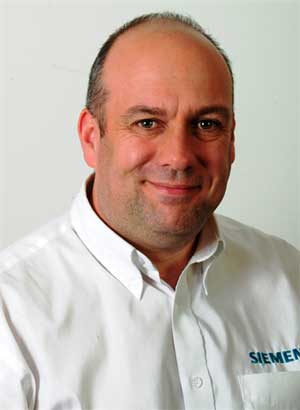
An innovative fast track degree programme is helping customers and suppliers of Siemens Digital Industries capitalise on the opportunities of Industry 4.0.
The one year top up degree gives engineers a BEng Hons in Control and Automation.

Co-designed and delivered by Siemens Digital Industries and the University of Salford it uses a block delivery model combining academic modules in automation, robotics, and embedded systems. The course also covers Siemens S7 certified PLC programmer training and accreditation, and a workplace project to solve a real-world problem.
Since its launch in 2017 more than 40 students have taken the course. They include both Siemens personnel and external trainees from global companies as well as small and medium firms.
One such company is Fairfield Control Systems, a Siemens solution partner that specialises in the design, manufacture, installation, commissioning and support of industrial control solutions in a wide range of markets. Its work includes the supply of systems for sites including Tower Bridge, Wimbledon Centre Court’s retractable roof, the London Eye, and the Falkirk Wheel.
Fairfield began enrolling engineers on the programme in 2019. Engineering director Peter McMorrow said: “We need to increase the pipeline of talent every year. By moving to the Siemens one-year degree programme we can accelerate the upskilling process of our engineers, while the block release approach allows them time to focus on their studies and condense their learning periods.” He added that the accelerated degree is “an attractive recruitment tool”.

Among those graduating is Jack Wilson, a 34-year-old design engineer, who left a well-paid job in construction to embark on Fairfield’s apprenticeship scheme, and who had previously doubted his ability to achieve a degree level qualification.
Design engineer Billy Hanner, 22, graduated with a first-class degree last year despite navigating the challenges of autism. In academic settings he struggled with exams, although he excelled in practical assessment. “My academic experiences have been a mixed bag, but the degree programme really brought the best out of me,” Billy said. “The block release approach meant that I could focus on a topic. I was then able to immediately apply the new skills and knowledge to my job.”
The programme is aimed at those at HNC/HND level seeking to gain new skills and study through to degree level. It is available both for apprentices as part of a degree apprenticeship, funded by the apprenticeship levy, or as a separate continuing professional development initiative for non-apprentices.
Risk assessment
Separately, NEBOSH (the National Examination Board in Occupational Safety and Health) and the Health and Safety Executive have launched an introductory qualification in practical health and safety risk management skills.
The NEBOSH HSE Award in Managing Risks and Risk Assessment at Work aims to provide the fundamentals needed to build an effective approach to risk management in their workplace.
It is suitable for any employee or team member in a low- to medium-risk setting. Students will learn the principles of risk management and how to identify and evaluate hazards, how to complete a risk assessment and to use simple tools to control risk.
NEBOSH’s network of accredited learning partners offers options for both online and classroom learning.
Further information:
Siemens: https://new.siemens.com/uk/en/products/services/industry/sitrain/personal.html
Nebosh: www.nebosh.org.uk/hserisk

